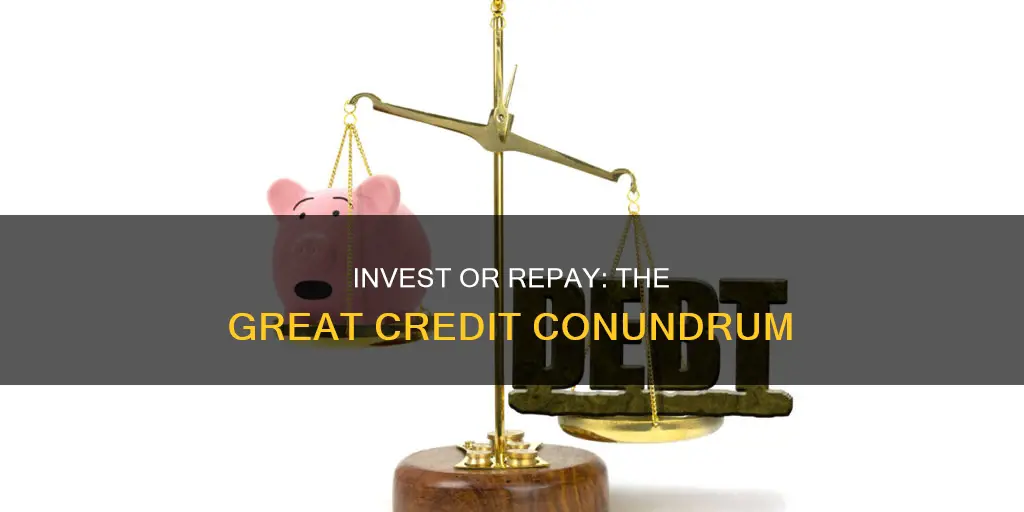
Deciding whether to pay off debt or invest can be a difficult decision. Both are worthy goals, and the answer depends on your financial situation.
If you have extra cash each month, you may wonder what to do with it. A good first step is to create a budget to see how your monthly income is used. Experts recommend using a 50/30/20 approach: 50% of your income goes towards necessities, 30% towards discretionary spending, and 20% towards savings and debt payments.
It's also important to have an emergency fund to help you through challenging financial times. Experts recommend having three to six months' worth of expenses set aside.
If you have high-interest debt, such as credit card debt, it's generally better to focus on paying that off first. The interest rates on credit cards are usually higher than the returns you would get from investing. By paying off your credit card debt, you'll save money on interest and improve your credit score.
On the other hand, if you have low-interest debt, such as a mortgage or student loan, investing may be a better option. Investing early allows you to take advantage of compounding interest, which can help your money grow over time. Additionally, certain types of debt, such as student loan and mortgage interest, are tax-deductible, providing a tax benefit.
Ultimately, the decision to pay off debt or invest depends on your financial situation, risk tolerance, and investment goals. It's essential to consider the interest rates on your debt and the potential returns on your investments when making your decision.
| Characteristics | Values |
|---|---|
| Pros of paying off debt | Less interest to pay, more money to invest, improved credit score, improved mental health |
| Cons of paying off debt | Miss out on benefits of compounding interest, tax benefits of investing |
| Pros of investing | Compounding interest, tax benefits, investing returns may outweigh interest paid on debt |
| Cons of investing | High-interest debt costs more over time, may be difficult to pay off |
What You'll Learn

Weigh up the interest on debt vs. the return on investments
Deciding whether to pay off debt or invest can be challenging. It is a dilemma that many people face, especially with household debt in the United States skyrocketing to $16.5 trillion in the third quarter of 2022. The answer depends on your financial situation, but there are some key considerations to help you decide.
If you can earn more on your investments than your debts are costing you in interest, then investing makes sense. For example, if you have a mortgage with an interest rate of 5% and you invest in a stock market index fund returning 10% per year, you will benefit by investing. However, if you have credit card debt at 20%, you are better off paying off that debt rather than investing.
Credit cards tend to have high-interest rates, so it often makes sense to focus on clearing this debt before investing. For example, in 2022, credit card interest rates hit 19.04%, the highest since 1985. Unless you are earning more than 19.04% on your investments, it is more beneficial to pay off your credit card debt.
That said, it is not always straightforward. Investments can be volatile, and some investments with guaranteed interest rates, such as bank certificates of deposit, tend to have low rates of return that may not exceed credit card interest rates.
Your risk tolerance is another factor to consider. Investing in the stock market may be suitable if you are comfortable with the risk of your investments rising and falling with the market. However, if the thought of market volatility keeps you awake at night, you may be better off prioritising debt repayment.
Other considerations
Your credit score is another important factor. Paying off debt, especially credit card debt, can improve your credit score, which is essential if you want to borrow money in the future, such as for a mortgage or car loan. A low credit score can also impact other areas of your life, such as insurance premiums and employment opportunities.
Your retirement timeline is also crucial. While it is generally best to avoid bringing debt into retirement, some debt, such as a mortgage, is more acceptable than high-interest credit card debt. As you approach retirement, prioritise clearing bad debt while also maintaining steady retirement investments, especially if your employer offers matching contributions to a retirement plan.
Investing in Others: A Worthy Bet
You may want to see also

Assess your financial baseline
Assessing your financial baseline is crucial when deciding whether to invest or pay off credit. Here are some key steps and considerations to help you evaluate your financial baseline effectively:
- Understand the concept of a financial baseline: A financial baseline is your current financial position. It involves examining your spending, saving, and giving habits. It's different from a budget, as it reflects your actual financial behaviour rather than a planned allocation of funds.
- Track your spending and saving habits: Look back on 60–90 days of bank statements or start recording your spending from now. Categorise your expenses into necessary and unnecessary spending to gain a clear picture of your financial baseline.
- Analyse your baseline: Ask yourself critical questions such as: How much am I saving and giving? How much of my spending is beneficial in the long term? Where is the majority of my money going? Do I have any money left at the end of the month? Where can I reduce unnecessary spending?
- Create financial goals: Set short-term and long-term financial goals that are SMART (specific, measurable, achievable, relevant, and timely). For example, you may aim to save a certain percentage of your income each month or work towards building an emergency fund.
- Prioritise your financial goals: Determine which goals are most important to you and allocate your resources accordingly. This may involve paying off high-interest debt, building an emergency fund, or investing in your retirement account.
- Consider your risk tolerance: Evaluate your comfort level with financial risk. If you are risk-averse, paying off debt may be a more appealing option than investing in volatile assets. On the other hand, if you are comfortable with risk, investing in stocks or mutual funds may be a suitable choice.
- Weigh the interest rates: Compare the interest rates of your debts with the potential returns on investments. If you can earn a higher return on your investments than the interest rate on your debts, investing may be more advantageous. Conversely, if you have high-interest debt, prioritising debt repayment can provide a better return on your money.
- Evaluate the mental and emotional aspects: Consider the mental and emotional impact of debt. Eliminating debt can provide peace of mind and relieve stress. Weigh this against the potential financial benefits of investing to decide which option aligns better with your personal well-being.
Invest Now or Later?
You may want to see also

Consider your risk tolerance
When deciding whether to invest or pay off debt, it's important to consider your risk tolerance. This refers to the degree of risk that an investor is willing to take on, given the volatility in the value of an investment. It often determines the type and amount of investments that an individual chooses.
There are generally three types of risk tolerance: aggressive, moderate, and conservative. Aggressive investors have a higher risk tolerance and are willing to risk losing money to achieve potentially better results. They tend to be market-savvy and follow strategies aimed at achieving above-average returns. Their investments usually focus on capital appreciation rather than income preservation. As such, their asset allocation typically includes stocks, with little to no allocation to bonds or cash.
On the other hand, conservative investors have a lower risk tolerance and seek investments with guaranteed returns. They are often retirees or those approaching retirement age, as they are unwilling to risk losing their principal investment and tend to have a short-term investment strategy. Conservative investors typically opt for investments that are guaranteed and highly liquid, such as bank certificates of deposit, money markets, or U.S. Treasuries.
Moderate investors aim to balance opportunities and risks, with their portfolios consisting of a mix of stocks and bonds, such as a 50/50 or 60/40 structure.
Your risk tolerance is influenced by various factors, including your age, income, investment goals, and financial situation. For example, younger investors may be more comfortable with aggressive stock portfolios, as they have more time to recover from market downturns. On the other hand, older investors approaching retirement may prefer a more conservative approach to protect their financial goals.
Additionally, your ability to take on risk may change over time as your financial circumstances evolve. For instance, if you have a specific financial goal with a short time horizon, investing in stocks or bonds may not be advisable as you would need the cash soon. In contrast, if you have a longer time horizon, you may be able to withstand higher risks to pursue potentially higher returns.
It's important to note that all investments involve some level of risk, and understanding your risk tolerance can help you make informed decisions about how to allocate your money between investing and debt repayment.
Investing During Depressions: Strategies for Success
You may want to see also

Don't neglect your credit score
Your credit score is a three-digit number that lenders use to decide whether to offer you a mortgage, credit card, or another form of credit, and the interest rate you will be charged. A higher credit score will generally give you access to better credit deals, so it's important to understand how your actions can affect your score.
How Credit Scores Work
Your credit score is calculated based on your credit history and various other factors, including:
- Payment history
- Credit utilization
- Length of credit history
- Type of credit
- New credit inquiries
Improving Your Credit Score
- Make all your credit card payments on time.
- Keep your credit utilization below 30% of your available credit limit.
- Maintain a long credit history by keeping your oldest credit accounts open, even if you're not using them.
- Have a mix of different types of credit, such as credit cards, installment loans, and mortgage loans.
- Limit new credit inquiries by spacing out your credit applications and avoiding applying for multiple credit cards in a short period.
Maintaining a Good Credit Score
Once you've achieved a good credit score, it's important to maintain it by continuing the good habits that helped you build your score. Here are some additional tips:
- Set up automatic payments for all your credit accounts to ensure you never miss a payment.
- Regularly monitor your credit report to detect any signs of identity theft, which can significantly damage your score.
- If you have a high credit score, you can consider closing one or two accounts without causing major damage to your score. However, try to keep your credit cards with the highest limits open.
Benefits of a Good Credit Score
Having a good credit score can provide several benefits and make your life easier and more affordable:
- Easier credit approval: Lenders are more likely to approve your credit applications, and you may receive more favourable terms.
- Lower interest rates: A good credit score may result in lower interest rates on loans and credit cards, saving you a significant amount of money over time.
- Improved chances of securing a rental apartment, insurance, or even a job, as landlords, insurers, and employers often use credit scores as a measure of an individual's reliability and responsibility.
Investing: Timing the Market
You may want to see also

Consult a financial advisor
Consulting a financial advisor can be a great way to get an expert opinion on your specific situation and make an informed decision about whether to invest or pay off credit. Here are some reasons why seeking professional advice can be beneficial:
- Expertise and Experience: Financial advisors are qualified professionals with extensive knowledge of investment strategies, debt management, and financial planning. They can provide guidance based on your unique financial circumstances, goals, and risk tolerance.
- Comprehensive Financial Review: Advisors will conduct a comprehensive review of your financial situation, including your income, expenses, assets, liabilities, and financial objectives. This holistic analysis helps them understand your overall financial health and advise you on the best course of action regarding your credit and investment decisions.
- Risk Assessment and Management: Financial advisors can help you assess and manage risk effectively. They will consider factors such as your risk tolerance, market volatility, and the potential impact of investment choices on your financial goals. By understanding your risk profile, advisors can tailor their recommendations to align with your comfort level and objectives.
- Investment Strategies: Advisors can provide insights into various investment options, such as stocks, bonds, mutual funds, or other vehicles. They can help you navigate the complexities of the investment landscape, including diversification strategies, tax implications, and market trends. This guidance ensures that your investment decisions are well-informed and aligned with your goals.
- Debt Management and Payoff Strategies: Financial advisors can assist in developing a comprehensive debt management plan. They will consider factors such as the types of debt you have (credit card, mortgage, student loans, etc.), interest rates, and the impact of debt on your credit score. Advisors can provide strategies for prioritizing debt payoff, consolidating debt, or exploring options like balance transfers or debt consolidation loans to help you effectively manage and reduce your debt.
- Retirement and Long-Term Planning: Seeking advice early on can help you make informed decisions about retirement planning. Advisors can guide you in maximizing retirement account contributions, taking advantage of employer matches, and choosing appropriate investment options within your retirement plan. They can also help you strike a balance between investing for the long term and paying off debt to ensure you're on track to meet your retirement goals.
- Behavioral Coaching and Accountability: Financial advisors not only provide technical expertise but also offer behavioural coaching. They can help you stay disciplined and accountable in achieving your financial goals. This includes helping you stick to your investment plan during market fluctuations and providing support to avoid impulsive financial decisions.
- Ongoing Support and Monitoring: When you engage a financial advisor, you benefit from ongoing support and monitoring of your financial progress. They will regularly review your investment portfolio, adjust strategies as needed, and ensure you stay on track. This proactive approach helps you navigate changing market conditions and life circumstances while working towards your financial objectives.
Remember, when choosing a financial advisor, it's essential to select one who is a fiduciary and always acts in your best interest. Be sure to understand their qualifications, fees, and services offered before engaging their services.
Dividend ETFs: Smart Investment for Young People?
You may want to see also
Frequently asked questions
This depends on your financial situation. If you have high-interest debt, it is generally recommended to pay this off first. However, if you have a low-interest loan or credit card, you may want to invest your money instead, as you could earn more in interest than you are paying on your debt.
The sooner you eliminate debt, the less interest you will have to pay. Paying off debt can also improve your credit score, which is important if you want to take out loans in the future. It can also be a weight off your shoulders, improving your mental and emotional wellbeing.
Investing allows you to take advantage of compounding interest, which is interest earned on your interest. The earlier you start investing, the more time your money has to grow. Investing also provides tax benefits, as certain types of interest, such as student loan and mortgage interest, are tax-deductible.







